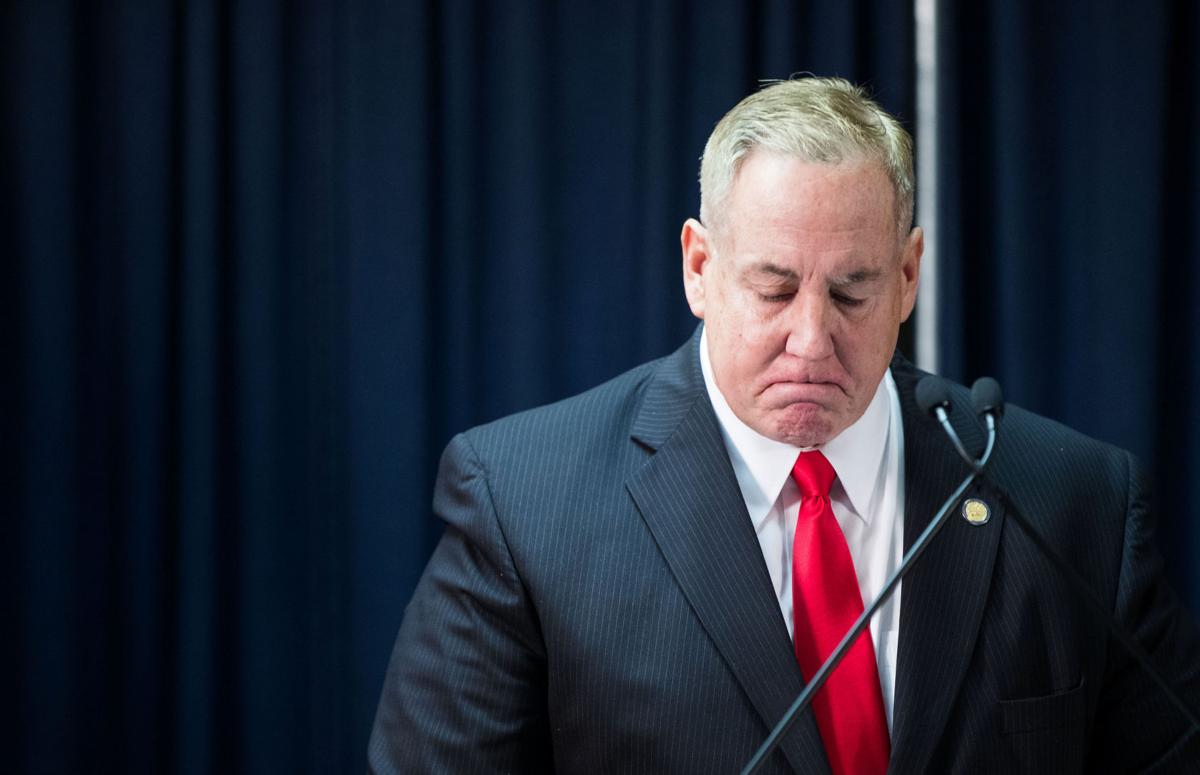So if you haven’t heard, Bill Kintner, a Nebraska State Senator of District 2, resigned after using his state owned computer for cybersex, and for saying a bunch of really nasty things on Twitter, and for just generally being kind of a jerk.
Yeah, he’s not too happy. I wouldn’t be either, not when our license plates look like this. Credit: Brendan Sullivan, The World-Herald
So, without wishing ill upon him, it’s undoubtedly a good thing he resigned. But it’s not just because there are much better people up for the job. Bill Kintner’s resignation, if we look more closely, can be a window into understanding the broader state of civic life in America, and the moral decisions which are leading to its disintegration.
Though some are heralding the news as a victory for the Women’s March, fundamentally, Kintner's resignation isn't about the issues or partisanship, but something nobler: Our elected officials coming together and deeming some behavior so repulsive, it demands resignation. No one except Kintner is denying that; because everyone else -- Pete Ricketts, staunch Republicans, security guards -- cheered his resignation. And in this era where politicians are seen as untrustworthy, unethical characters, where partisan lines rule -- that is proof there exists some standard of conduct to which we hold ourselves in this country. And this, as we shall see, is far more wholesome and good for the integrity of our system of government than taking his resignation as a symbol for political gain.
It's not that we don’t have standards of ethical behavior for politicians in America, it’s just that Kintner didn’t say enough terrible things for those rules to no longer apply.
But let us now ask, why? Why is the integrity of the political system more valuable than the ends of the movement? Even if people were to claim Kintner's resignation as a victory for [insert ideology or party here], why would that be such a bad thing? Certainly, in these partisan times, we've seen many in power demonstrate an attitude like this and behave in this way.
The fact is, our system of government, and the standards of conduct within it and surrounding it, which enables such powers of speech and activism and freedom, is wholly an entity more sacred than nearly any movement within it. This does not diminish the importance of the movement, but merely recognizes its place as being a byproduct of a functional democracy. Movements, parties, or organizations which attempt to hijack acts or symbols of common decency and unity for their own political gain do so at the expense of our common good. We must always place our integrity of government above our political ends; and we may think to this fact as we wonder how our country has ended up with politicians of questionable character and temperament in power.
When voting in 2018, try to remember that whoever you vote for will have the duty of upholding the values represented by this picture. May your candidate also be entirely a creation of bad Photoshopping.
But as different entities continue to undermine their integrity, and the integrity of our government, in pursuit of their ends, they fundamentally undermine Americans’ trust in them. What proof of this fact do we have? Gallup released a report just last year, showing that Americans’ trust in the media has fallen 20 points in 20 years, to a low of just 32% saying that they have a “great deal/fair amount” of trust in the media. Trust in the government, the Supreme Court, public schools, banks, and the medical system isn’t much better. In fact, the two most trusted institutions are, interestingly enough, small businesses and the military. How about fellow Americans? Certainly, in this era of populism, we trust each other more than the ruling elite? Not quite so, it seems; only 31 percent of people say that “most people can be trusted,” according to another recent poll.
I’ve been frustrated by this for a long time. And I’ve wondered, quite foolishly and egotistically, how I alone could change this trend towards disunity. But here’s the truth: Democracy is a social institution, made possible only because a lot of people are willing to place trust, and taxes, into this abstract concept of country. Without trust in our system, that framework crumbles. And as long as we are going to, on an institutional level, make decisions that maximize benefits to our own ideology, coming at the cost of our integrity, and the integrity of our political process, we will see our society continue to fade into divisiveness.
And figuring that out, knowing that’s what it means for the “media to be biased” or for Americans to be “polarized” – knowing that’s the reason why, is why Bill Kintner’s resignation was really, really exciting.



No comments:
Post a Comment